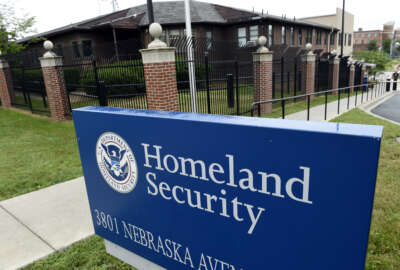
Intrigue, nastiness engulfs latest protest of DHS’ $1B cyber contract
Northrop Grumman filed its second protest over the Homeland Security Department’s decision to award Raytheon the DOMino contract.
Let’s add a little intrigue and nastiness to the already exciting saga of the $1.15 billion cybersecurity contract the Homeland Security Department has been trying to award for the last 10 months.
First the news: Northrop Grumman has submitted a second protest to the Government Accountability Office over DHS’ decision to award the DOMino contract to Raytheon.
DHS confirmed the protest to GAO, but wouldn’t comment any further.
Raytheon initially won DOMino in September. The goal of the huge contract is to provide enhanced protections to federal civilian agency networks, including the operations and maintenance of the EINSTEIN initiative and to design new cyber capabilities for the National Cybersecurity Protection System (NCPS).
Northrop protested the first award. DHS eventually took corrective action and relooked at bids, and decided again to award Raytheon the deal in early June.
Northrop filed its second protest on June 15.
This is where the intrigue and nastiness comes in — Northrop alleges DHS’ evaluation was flawed and there was a conflict of interest arising from Raytheon’s hiring of a former DHS official.
Multiple sources said Nicole Dean is the official in question. According to her LinkedIn profile, she ran the NCPS for three-plus years starting in 2008. She then moved to Raytheon in 2012 as its director of cyber business development.
Dean left Raytheon in October 2015 to be the global chief information security officer for Goodyear.
Just reading between the lines a bit, I’m guessing Northrop is claiming Dean gave Raytheon some sort of inside knowledge of EINSTEIN and the contract itself, which led to the conflict of interest.
It’s unclear if that’s the case or not given DOMino is a new requirement and not a follow-on contract.
Additionally, in the three years since Dean left DHS, EINSTEIN became a much bigger focus area for DHS and the Obama administration in the wake of the cyber sprint in July 2015 and the cybersecurity strategy that followed.
DHS Secretary Jeh Johnson said in January in responding to a harsh GAO report on EINSTEIN that in early 2015 only about 20 percent of the government used the latest version of EINSTEIN, known as 3A. A year later, Johnson said, EINSTEIN 3A is protecting 50 percent of the government and is now available to all agencies. DHS requested $471.1 million in the fiscal 2017 budget to sustain the EINSTEIN program, to continue to combat intrusions, enhance information sharing, and deploy analytical capabilities to secure the federal civilian information technology enterprise.
The other interesting issue this saga brings up is the revolving door between government and industry. When a federal executive leaves, there are specific rules governing their contact with their former agency and its personnel. But someone, such as Dean, offering their insights into the strategy to win a contract is what makes former feds so valuable even if they never talk to or set foot back in their former agency for a year or two or more.
If Northrop is alleging that Dean’s influence on the bid was a conflict of interest, does it have any evidence that she talked to or interacted somehow with her former DHS colleagues? I guess that’s for GAO to figure out.
GAO has until Sept. 23 to decide the protest.
A Raytheon spokesperson said all questions about DOMino should be directed to DHS.
Northrop Grumman and its lawyer, Jay Carey at Covington Burlington, didn’t respond to repeated emails asking for comment on the protest.
In 100 days or so, we will know more, but the fight for DOMino is certainly worth watching.
Copyright © 2025 Federal News Network. All rights reserved. This website is not intended for users located within the European Economic Area.
Jason Miller is executive editor of Federal News Network and directs news coverage on the people, policy and programs of the federal government.
Follow @jmillerWFED
Related Stories




